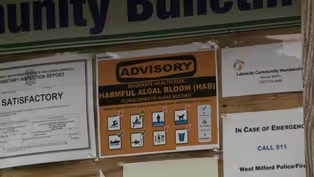NJ Spotlight News
NJ Spotlight News: July 25, 2023
7/25/2023 | 26m 46sVideo has Closed Captions
Watch as the NJ Spotlight News team breaks down today's top stories.
We bring you what's relevant and important in New Jersey news, along with our insight. Watch as the NJ Spotlight News team breaks down today's top stories.
Problems playing video? | Closed Captioning Feedback
Problems playing video? | Closed Captioning Feedback
NJ Spotlight News is a local public television program presented by THIRTEEN PBS
NJ Spotlight News
NJ Spotlight News: July 25, 2023
7/25/2023 | 26m 46sVideo has Closed Captions
We bring you what's relevant and important in New Jersey news, along with our insight. Watch as the NJ Spotlight News team breaks down today's top stories.
Problems playing video? | Closed Captioning Feedback
How to Watch NJ Spotlight News
NJ Spotlight News is available to stream on pbs.org and the free PBS App, available on iPhone, Apple TV, Android TV, Android smartphones, Amazon Fire TV, Amazon Fire Tablet, Roku, Samsung Smart TV, and Vizio.
Providing Support for PBS.org
Learn Moreabout PBS online sponsorship>> Tonight on NJ Spotlight News, those harmful algal blooms are back.
>> We know what to look for.
You look for that green slick in the water.
>> Bacterial concerns leading to lake closures.
Are the millions being spent on litigation helping?
Also, another dredging project is getting the.
Green light in the Garden State.
Congressman Frank Stallone -- Plus, service workers unite.
Governor Murphy signed the worker retention bill helping workers avoid termination when businesses change hands.
>> To be thrown out overnight for no reason is just cruel, wrong.
And now we have righted that wrong in the state of New Jersey .
>> And reaping the benefits of bud.
Towns across New Jersey are starting to see a major increase in tax revenue from recreational marijuana sales.
>> They are basically able to pay for their trash collection next year just off of cannabis alone.
>> NJ Spotlight News starts right now.
Announcer: Funding for "NJ Spotlight news" provided by -- members of the New Jersey Education Association, making public schools great for every child.
RWJBarnabas Health, let's be healthy together.
And Orsted, committed to the creation of a new long-term, sustainable, clean energy future for New Jersey.
♪ >> from nj pbs, this is NJ Spotlight News with Briana Vannozzi.
Briana: Good evening and thank you for joining us.
The Garden State is about to enter some of our hottest weather yet this week which means more people will be turning to the shores and lakes for a little relief.
But as temperatures rise, so does the amount of toxic bacteria blooming in our ponds and lakes, prompting closures and warnings to swimmers.
Public experts say the harmful algal blooms can cause organ damage in humans and kill pets.
What is worse, incidents are becoming more frequent thanks to a perfect combination of heat, humidity, and rain.
Stormwater runoff often filled with fertilizers that feed bacteria end up in bodies of water.
As Brenda Flanagan reports, it's a problem that is likely here to stay.
>> We know what to look for.
You look for that green slick on the water.
Brenda: She took a cool dip despite the orange hab, or harmful algal bloom sign posted.
They have advised swimmers that four locations around us like contain moderate really -- moderately risky levels of bacteria.
They have posted photos and lab tests online.
But the locals seem unfazed.
>> the water looks fine.
It's an advisory.
I feel like I have been advised.
But I am still going to do what I have been doing for 30 years, which is swim in my like.
>> The lake seems pretty clean, so people are swimming anyway.
>> They are not paying attention.
>> No one has really complained of any skinny rotation.
Brenda: Outbreaks are across the state.
Three high risk health warnings in red, 35 moderate in orange, 26 blue watches with milder health impacts, and 88 green not present results.
An advisory closes public beaches, but not necessarily those at private clubs.
Folks went fishing at cozy Lake, notwithstanding a red warning sign a pea green water with extremely high toxin counts.
Jersey is trending towards another hot, habby summer.
>> in 2022, our hab's increased about 38% since the program began.
And we are on course for the same amount this year.
We are having similar weather.
Brenda: Rainstorms wash nutrients into lakes where the fee the algae.
Climate change plays a role with warm winters and hot summers encouraging growth.
This season, creating perfect hab habitats.
>> They rinse the land, put in all the nutrients and then they just sit there and cook.
We have seen them going all the way back to early December.
Not only are there longer but they are hanging out for longer amounts of time.
Brenda: Princeton Hydro is working with the Greenwood Lake commission to clear out the weeds, look at the runoff that carries nutrients into the lake, and examine the algae.
>> The bottom sentiment are phosphorus rich.
The bacteria will have the advantage of growing, so it is more likely we are going to see even worse hab in hot weather days.
Brenda: Algae love phosphorus.
She's been testing Greenwood Lake for algae and toxin since 2016.
A new $1 million grant will help fund a three-year project to map out nutrient sources like Belcher's Creek.
>> We have a lot of scientific data showing that Belcher's Creek has been contributing a lot of nutrients into the Greenwood Lake.
Brenda: residents feel unfairly targeted because that is a different story at the lake's other half, located in New York.
>> My understanding is they have not had any closures in New York.
Brenda: But Jersey is more prone to bloom.
For now, businesses we spoke with our not feeling any adverse impact, unlike in 2019, when HAB scared tourists away.
That prompted changes in how the DEP reports HAB's, but it also galvanized communities into using state grants to improve its stormwater runoff and sewage systems.
>> One of the most important things we can focus on for HAB is how we manage stormwater and we have done quite a bit in the way of offering grants.
Last month we offered $7 million stormwater assessment grants.
Brenda: The trick is to turn them into programs that keep the lakes from turning green.
I'm Brenda Flanagan, NJ Spotlight News.
Briana: Meanwhile, the U.S. Army Corps of Engineers is kicking off a major dredging project this week in the Shrewsberry and Nava sink Rivers.
It's a 14 mile undertaking that will use millions of federal dollars to make it happen.
Once complete, proponents say it will make the waterways safer for voters, recreational, and commercial fishers who are vital to New Jersey's economy.
Ted Goldberg reports from the Highlands.
Ted: Sailors had a welcome sight this week.
A vote from the U.S. Carmi -- Army Corps of Engineers making it easier for voters to navigate.
>> We are making good progress and we are going to continue that.
>> The reason we did this project is because so many folders -- boaters were complaining about shoaling and the inability to get out of the rivers.
Ted: one is David Miller.
>> Over the years channels have become increasingly difficult to navigate due to the limited depth.
Ted: He is thrilled to see the start of a $26 million project to dredge about 14 miles worth of water in these rivers.
Miller says boats have been at risk of running aground and smashing into Shoals.
>> You get the high spots, sandbars and everything like that.
There is a lot of debris in the water since Sandy.
>> There are areas that have shoulda and it has not been dredging like this in 30 years.
You can understand there would be a lot of places where it is hard for the boaters to get in and out.
>> We have had floats come in, docks float to our place.
We have had to take the responsibility to take them out of the water and tear them apart and put them in the dumpster and have them hauled away.
Ted: Miller says that cost hundreds of thousands of dollars for the Longbranch ice boat and yacht club.
Thanks to an earmark in this year's federal budget, boats sailing around the two River communities will be less likely to suffer damages from underwater obstacles.
>> We have come across poles that have embedded themselves in the ground.
We have had guys hit them, shafts bent.
Nothing serious.
We have had a couple of transmissions went, but we do not know that was caused from hitting something.
Ted: The dredging is broken down into three phases with phase one starting less Friday.
The sand that gets dug up will be mostly used for beach replenishment projects nearby.
>> We're in it here with you, we will find good placement opportunities, we will enrich our Bay should -- our beaches, and ensure good habitats.
Ted: The Army Corps of Engineers says phases one and two will dredge nearly 100,000 cubic yards of sand.
The remaining 50,000 cubic yards from phase three will be handled by a private contractor and stored off-site, because it cannot go on beaches.
>> Pass to the oceanic bridge and further south up the Shrewsberry, past Gunning Island.
The material becomes saltier, and it's not useful to put on a beach because it is not compatible, it is not sand.
So that material still has to be dredged.
It still has to go somewhere.
Ted: The project manager says that is standard operating procedure for dredging material that cannot go on the beach.
Phases two and three are scheduled to start in the fall or winter.
Ted Goldberg, NJ Spotlight News.
Briana: Governor Murphy is wasting no time tapping a new commissioner to lead the state health department, announcing today he will nominate Dr. Caitlin Basten to assume the role in August following the retirement of Judy Purser Kelly who spoke with me yesterday about her departure.
Baston's career as a physician and in leadership roles has focused on addiction services, maternal and child health.
She is currently the division head of addiction medicine and the medical director of the Center for healing at Cooper University health care, a center she founded.
She earned her medical degree from Jefferson medical College at Thomas Jefferson University and is dual boarding in family and addiction medicine.
U.S.
Senator Bob Menendez is hitting the road to tout his new prescription drug legislation.
Joining with members of New Jersey's citizen action in Union City today, highlighting the key parts of his PBM, or patients before middlemen act, a proposed law he says will cut down the cost of prescription drugs, especially for seniors on Medicare part the.
We build targets third-party intermediaries that manage prescription drug benefits and pharmacy networks on behalf of health plans, determining which drugs will be covered, and how much patients will pay.
Menendez wants to decouple their compensation from drug prices and curb the fees they charge.
About 5 million Medicare beneficiaries struggle to afford their prescription medication, and one in four New Jersey adults report not filling, skipping, or cutting a dose of their prescription to make the medication last longer.
>> Our patients before the middlemen act these herbs to be signed into law.
Why?
Because when residents come to pharmacies like Sugarman's, they deserve to know that their drug costs are not lining the pockets of a PBM company they have never heard of.
Seniors and other patients deserve a health care system where shadowy middlemen are not working against their best interest.
We have a responsibility to bring down the skyrocketing cost of prescription drugs, which is why I will not stop, I will not rest, until the reforms included in our bill become the law of the land.
Briana: The former top aide to Senate President Nix go Terry will avoid prison time.
Instead, a federal judge in Newark on Monday sentenced Tony Teixeira to eight months of house Arrest and three years of probation.
Last year he admitted to participating in a scheme with fellow political operative Sean cattle to overcharge political campaigns and nonprofits, pleading guilty to one charge each of tax evasion and wire fraud.
He was facing a prison sentence of up to 25 years, but the judge imposed a lesser sentence, citing the single father of twins' presence as being critical to the special needs child.
He will also have to repay $98,000 to victims and another $47,000 to the IRS> He's the only person to be indicted in connection to Sean cattle's cooperation with the department of justice.
Cattle was recently sentenced to 24 years in prison for his role in a bizarre murder for hire plot in addition to the fraud scheme.
Meanwhile, an arrest has been made in the death of his six-year-old Somerset County girl who died while on her way to a summer program.
Authorities have charged school bus monitor Amanda was second-degree manslaughter and endangering the welfare of a child.
Prosecutors say she was on her cell phone with both ear buds i n, facing towards the front of the bus, when the six-year-old died.
Williams's parents say their daughter has a rare disorder and uses a wheelchair.
During the drive to Claremont elementary school last week, the nonverbal child's safety harness shifted, tightening around her neck, and suffocated her.
The school district is not commenting, but says its medical staff administered first-aid before transporting the six-year-old to a local hospital or she was pronounced dead.
Her grieving parents say they are now fighting to make sure no other family has to go through a similar tragedy.
A new law signed Monday by Governor Murphy aims to make it easier for victims of abuse to get a restraining order.
The law closes a so-called stranger loophole for victims who don't have a relationship with their abuser.
Until now, judges only issued productive orders without a criminal conviction for domestic violence cases, or in stalking cases if the victim was a minor or had a mental disability.
the new legislation expands that criteria and will include all stalking and cyber harassment cases to qualify for restraining orders.
Advocates have long called it a critical step towards saving lives and preventing frightening behavior from turning to harm.
Though critics warned the measure could be too broad and Bog down the court's already strained system.
In our spotlight on business report, Workers rights are front and center.
Governor Murphy this week signed a bill aimed at protecting service workers from a sudden and unexpected loss of employment caused by a change of ownership where they are employed.
It makes just the second state in the nation with such a law on the books.
But as senior correspondent Joanna Gagis reports, the business industry says it is yet another overreach by the governor, one that removes an employer's right to run their company how they see fit.
>> You have to figure out how you are going to feed and take care of your family, what you're going to do.
Because you have been on the job for a long time.
Joanna: She a janitor who works at the Preudential Center under a company called ABM.
Her company has changed ownership several times in the 16 years she has been working there, causing her anxiety.
>> We had Prichard, then we one from Prichard to Eastern janitorial.
They came in, they were getting rid of all the workers, and we fought them to bring the workers back.
And now, they left and we have ABM.
Joanna: So you have seen this transition happened a few times and withstood it?
>> Yes.
Joanna: Now you want to make sure everyone else does too?
>> Yes.
It is a good day because everyone is protected.
Joanna: That is because Monday, Governor law signed a law that protects service worker's jobs when they change ownership or contracts.
>> This is a game changer for service workers.
When the building changes its contractor or any facility changes their contractor, or the ownership of a building changes, the workers get to stay on for at least 60 days with the new employer, whoever that is, and prove they can do a good job.
That is just a game changing thing for folks.
Because we have seen many workers just get tossed out.
>> This really buys time, because it provides for a period of time in which the employee needs to be retained.
Is this actually a panacea?
>> no, it's not.
But it gives employees a shot for 60 days to show they can do a good job.
Joanna: It also requires 15 days notice before ending a service contract.
An assemblyman sponsor the bill that will impact more than 50,000 in the state.
>> It is designed to protect workers, and specifically the lowest paid.
Security guards, janitors, people who work in buildings to keep them clean.
The most oft-times th least paid.
This bill protects them at least in which the building in which they are working is sold from one group to another.
Joanna: While the new law is lauded by the union, it's met with the New Jersey business Association.
>> We see it as the most far-reaching iteration of mandates to date in New Jersey.
While it's being marketed as employer retention after a change of ownership, this goes beyond this retaining employees and goes down to the contract by contract level.
Joanna: She says that hamstrings companies from firing a service provider they are unhappy with, and could put other employer's work at risk.
>> For example, there is a large office building that hires my cleaning company, they hire Joanna's cleaning company.
You would now need to maintain my employees for 60 days.
That does not take into account if I have other jobs I can bring my employees to, if you have your own workers you want to bring in to work there.
Their employment might be at risk.
Or if the building was not satisfied with the work of those employees in the first place.
Joanna: And adding those additional workers could hurt their brought online -- bottom line.
>> It is a tight labor market and attracting and retaining workers is difficult as it is.
Now you have to contend with these workforces.
Joanna: Will this temporary protection actually save jobs where will it hurt business's bottom lines, as they allege?
Will play out when the bill takes effect October 23.
Joanna Gagis, NJ Spotlight News.
Briana: UPS and the Teamsters union have reached a tentative deal on a new contract.
Potentially avoiding one of the largest strikes in U.S. history.
One experts say would have crippled the supply chain.
Both the delivery company and the union representing some 300,000 workers are calling the agreement historic.
Under the tentative five year deal, worker pay will increase by $2.75 an hour this year and $7.50 an hour over the length of the contract.
Current part-time workers will make at least $21 an hour, double the amount negotiated in the previous UPS Teamsters contract.
Union president Sean O'Brien today said the deal sets a new standard in the labor movement.
It comes as workers are becoming increasingly empowered, with unionized nurses, teachers, actors, and writers striking, some for the first time in decades, and as UPS and auto workers threatened walkouts and authorized strikes.
When Townes agreed Lester to open borders for new recreational cannabis dispensaries, they were promised a windfall of cached.
Money that would degenerated through a 2% transfer tax placed on every sale.
Now, the towns that were first in mind for the state's cannabis industry are beginning to reap the benefits.
Mike Davis is a reporter with the Asbury Park press you crunched the numbers to see just how much and on what that money is being spent.
He joins me now.
So you did a lot of digging, a lot of analyzing of the data here.
What largely did you find that towns are using this money from the sales of marijuana for?
Mike: It kind of varies.
I think it depends on how big the town is.
A town like Elizabeth is much different than a Bellmore.
I think in some of the smaller towns it is as easy as looking at the budget and finding line items and comparing.
Lauren Township, their business administrator told me they are basically able to pay for the trash collection next year off of cannabis alone.
In some municipalities it might not be that much.
If you are talking a $100 million budget, a couple hundred grand might not be that much.
But in New Jersey where property taxes are at the forefront of everybody's brain, having any extra revenue to keep that down will be a huge win.
Whether it is a big town or a small town.
Briana: You mentioned a couple municipalities.
How much money are we talking?
I know you looked specifically at the areas where cannabis dispensaries opened last year, April of 2022.
So not the full amount that we now have operating.
Mike: That's right.
Just to compare apples to apples, if you look at the towns were dispensaries opened on day one last year, it is about 12.
We have numbers from 10 of the towns and a range between $150,000 for 2022 to over $1 million.
There's no rhyme or reason to what the revenue looks like each different town.
There are some bigger municipalities that fall on the low end of the spectrum and then you have a small town like Belmar with 15,000 people and they are bringing in over $1 million.
Some of it has to do with location.
If you have a dispensary in your area and there is nothing within a half an hour of you, you're likely to get more customers, more likely to get more sales and tax revenue.
When you look at places in North Jersey, like Hudson County, there are so many dispensaries, and that is where the huge population is.
There, the numbers are still high because of just the sheer number of people, but probably not to the level of impact you see in other parts of the state.
Briana: That makes sense.
On that note I am wondering if these towns are anticipating seeing some of these revenue numbers shrink as we see the market expand.
Mike: I think in the long term yeah, those numbers will go down.
But right now there are 35 locations in New Jersey where you can buy recreational cannabis.
That is not nearly enough.
There is still a huge level of the market completely untapped.
The numbers are still going to go up for at least another year or two.
Some of the officials I was talking to say their numbers should double in 2023.
But you are right, once the other municipalities get online, and we are still in a position where only about 25% of the state allows dispensaries.
The more towns come online, the more of these projects that are in the process of going through the motions right now with licenses, once those come online I think eventually you will see more supply, and it goes down.
But municipalities are thinking ahead.
The folks I talked to the knees first 12 towns saw an opportunity, yeah, for a couple of years we are going to get that extra revenue.
If it evens out in the long run that is fine but at least we got the big boom early on.
Briana: Better than collecting nothing.
Mike Davis, really great work.
Thank you so much for sharing your reporting with us.
Wall Street has been experiencing one of its longest winning streaks in more than six years.
Here is how stocks closed today.
That is going to do it for us tonight.
But a reminder to download the NJ Spotlight News podcast so you can listen anytime.
I'm Briana Vannozzi.
For the entire NJ Spotlight News team, thanks for being with us.
Have a great evening.
We will see you back here tomorrow.
♪ Announcer: NJM insurance group, serving the insurance needs of residents and businesses for more than 100 years.
Horizon Blue Cross Blue Shield of New Jersey, an independent licensee of the Blue Cross Blue Shield Association.
New Jersey realtors, the voice for real estate in New Jersey.
More information is online at NJrealtor.com.
And by the PSEG foundation.
♪
Dredging begins of Shrewsbury and Navesink rivers
Video has Closed Captions
Clip: 7/25/2023 | 3m 59s | Boaters had complained about high spots, silt and sandbars (3m 59s)
Harmful algal blooms are back in NJ lakes
Video has Closed Captions
Clip: 7/25/2023 | 4m 59s | Department of Environmental Protection maps outbreaks across the state (4m 59s)
Murphy to nominate Dr. Kaitlan Baston as health commissioner
Video has Closed Captions
Clip: 7/25/2023 | 56s | Judy Persichilli is set to retire in August (56s)
New NJ law closes 'stranger loophole' in restraining orders
Video has Closed Captions
Clip: 7/25/2023 | 1m | The law expands protections for victims of abuse and stalking (1m)
NJ towns count up tax revenue from cannabis sales
Video has Closed Captions
Clip: 7/25/2023 | 4m 22s | How are municipalities benefiting? How are they spending the money? (4m 22s)
Service workers in NJ get new employment protections
Video has Closed Captions
Clip: 7/25/2023 | 4m 26s | New law is 'designed to protect workers, and specifically the lowest paid' (4m 26s)
UPS and Teamsters reach tentative contract agreement
Video has Closed Captions
Clip: 7/25/2023 | 1m 12s | Voting to ratify the contract will begin Aug. 3 (1m 12s)
Providing Support for PBS.org
Learn Moreabout PBS online sponsorship
- News and Public Affairs

Top journalists deliver compelling original analysis of the hour's headlines.

- News and Public Affairs

FRONTLINE is investigative journalism that questions, explains and changes our world.












Support for PBS provided by:
NJ Spotlight News is a local public television program presented by THIRTEEN PBS






